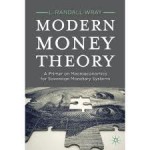By L. Randall Wray
 The Primer has run its course. I did not get to cover quite all of the topics I had planned. However, for those of you who want the whole Primer can read The Book: Modern Money Theory: A Primer on Macroeconomics for Sovereign Monetary Systems. Pre-order your copy here.
The Primer has run its course. I did not get to cover quite all of the topics I had planned. However, for those of you who want the whole Primer can read The Book: Modern Money Theory: A Primer on Macroeconomics for Sovereign Monetary Systems. Pre-order your copy here.
As the marketers say, if you liked the Blog, you’ll love the Book. As we went along with the blogs, I tweaked the manuscript. I incorporated a Q&A section following many of the chapters, taking account of your responses. I added topics that seemed to interest you, but that I did not have time to address in the blog. It also has an index and bibliography. And I changed the order substantially in order to make the argument more coherent. The book is in printing now so I expect you can get it by August.
This week we will wrap up with a discussion of the “nature of money”. Really that is what we’ve been getting at for approximately 52 weeks. I think this is what distinguishes what we do here at NEP from other bloggers who understand much of the basics. It is not just that a sovereign government faces no financing constraint, other than constraints it self-imposes. It is not just that bond sales are a reserve drain. It is not just that a JG provides a wage anchor. In my view, MMT is an approach that allows us to understand the nature of money in the sort of economy we find ourselves. And since money is the most important economic institution in our economy, we really cannot understand what our economic system is all about if we get money wrong.
Continue reading →













